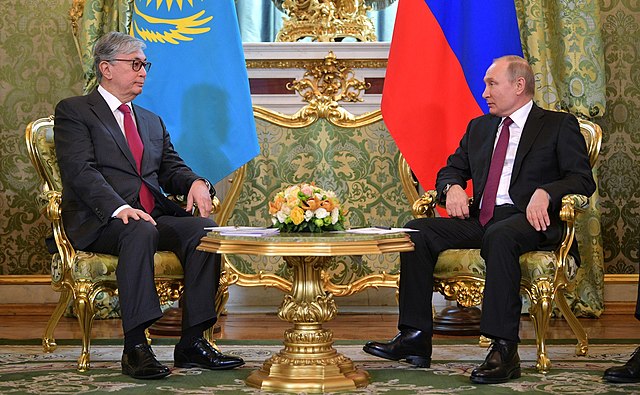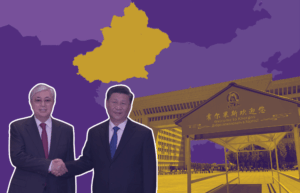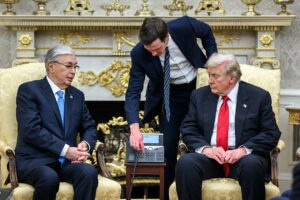DECRYPTION. In January 2022, Kazakhstan was able to count on the support of Russia, through the Collective Security Treaty Organization (CSTO), to put an end to the demonstrations which shook several cities in the country. But since the start of the war in Ukraine, Moscow’s best Central Asian ally has been trying to gradually distance itself from this embarrassing and uncertain neighbour.This article was originally published on Novastan’s French website on October 4, 2022. Kazakh President Kassym-Jomart Tokayev never supported the Russian invasion of Donbass. This behaviour clearly did not sit well with Vladimir Putin, who counted on the support of his strongest “near stranger”. How far can Kazakhstan get away from Russia? Deciphering the manoeuvres of a country that tries to distance itself from the Kremlin, without attracting its wrath. “We do not recognize Taiwan, Kosovo, South Ossetia and Abkhazia. In all likelihood, this principle will be applied to quasi-state entities[…]Luhansk and Donetsk”. In these words spoken at the St. Petersburg economic forum on June 15, Kassym-Jomart Tokayev laid his cards on the table to Vladimir Putin: no, he will not clearly support the war in Ukraine, unlike his Chinese and Belarusian allies.
Nevertheless, this did not prevent the Kazakh President from continuing to maintain his relations with his Russian counterpart: on August 19, the two Presidents met in Sochi to discuss their economic relations. The two parties displayed a cordial understanding and affirmed their desire to strengthen the Russian-Kazakh partnership, notes the Kazakh media Astana Times. Kassym-Jomart Tokayev and Vladimir Putin then met at the last summit of the Shanghai Cooperation Organization (SCO). As far as military affairs are concerned, Kazakh troops participated in the Military Games organized by Russia in August, recalls the English language media The Diplomat. But if diplomatic relations remain cordial, it is only an appearance. Kazakhstan, which has let more than 98,000 Russians cross its borders since the start of the partial mobilization in Russia, is trying not to be dragged into the war in Ukraine, while trying not to offend its “big neighbour”, whose reaction may have uncertain implications for its national security.
Cautious diplomacy
On September 17, during the UN General Assembly, Kazakhstan decided to abstain during the vote which would allow Ukrainian President Volodimyr Zelensky to speak or not. It also abstained on a resolution demanding the end of the war and the withdrawal of Russian troops from Ukraine, recalls Radio Azattyq, the Kazakh branch of the American media Radio Free Europe. A week after the start of the Russian invasion in February, Kassym-Jomart Tokayev had called on the parties to “seek compromises”. This sums up Kazakhstan’s careful diplomacy since the start of the Russian invasion. Astana maintains a certain neutrality regarding the war in Ukraine, which is increasingly difficult to maintain. Not wanting to criticize Russia directly, Kazakhstan confines itself to recalling the importance of defending the territorial integrity and sovereignty of states.
Tracking Western sanctions against Russia
But behind the official statements, there are the facts. At the economic forum in Saint-Petersburg, Kassym-Jomart Tokayev asserted that the sanctions “were the sanctions” and that Kazakhstan would not oppose them, reports Radio Free Europe, in order not to be in turn disapproved of by the West. Read more on Novastan: Central Asia and Russia: an ever-changing relationship In September, the largest country in Central Asia indeed opposed the legalization of parallel imports, preventing Russian and Belarusian truckers from importing goods from Europe, explains the Kazakh news agency KazTag, in order to align with European legislation. In the banking sector, the Halyk bank, the most important in Kazakhstan, announced on September 21 the suspension of payments by Mir card for Russians in Kazakhstan, reports Radio Azattyq.
An upcoming CSTO departure?
The estrangement of Kazakhstan and Russia could also have repercussions in the military field. After the new clashes between Azerbaijan and Armenia since September 15, rumours that Kazakhstan plans to leave the CSTO have spread on social networks, reports the Kazakh media Tengri News. While these rumours have been denied by a press release from the presidential administration, and while the military exercises of the CSTO are still planned to take place from September 27 to October 5 in Kazakhstan, the exit of the country from the military alliance would be made possible by the Kazakh administration, explains political scientist Arkady Dubnov in an article by the Kyrgyz media Kaktus. Indeed, following the annexation of four Ukrainian republics on September 29, “the Kremlin will have the right to use the most effective means to protect Russia, including nuclear weapons” explains the political scientist. Moscow has responded to the call of the Kazakh President and stepped up during the demonstrations of January 2022, so “Russia could try to attract allied countries, [including Kazakhstan], to its military operation in Ukraine”, which would be strongly against Kazakhstan’s interests.
Breaking away from Russian influence
In the public sphere, Kazakhstan is trying to rid itself of Russian influence through various means. The cancellation of the May 9 military parade, the most important holiday in the Soviet Union and then in Russia, which had also been celebrated in Kazakhstan, was already a strong signal of distancing. Earlier, President Kassym-Jomart Tokayev had refused to be decorated with the Order of Alexander Nevsky, a high Russian distinction generally awarded to national civil servants or eminent foreign politicians, reports the Kazakh media Vlast. More recently, during the official visit to Baku, the Kazakh President spoke to the Azerbaijani President Ilham Aliyev not in Russian as usual, but each in their native language, being able to understand each other thanks to the Turkic roots common to Azeri and Kazakh. A dangerous game for Kazakhstan? The consequences of the estrangement with Russia seem to have already been felt during the summer. In less than a few months, the route through which Kazakhstan exports 80% of its oil, the Caspian Pipeline Consortium, had to stop working, officially due to technical problems, reports the Reuters news agency. This event, however, shows signs of tension between Russia and Kazakhstan, with Moscow “punishing” Astana for its non-support of Russian positions. These tensions were bolstered by a Facebook post by former Russian Prime Minister Dmitry Medvedev, denying Kazakhstan’s national sovereignty. Even though the post was immediately deleted after publication, stated to be a hack according to Russian officials, several analysts envisage the reproduction of the Ukrainian scenario in Kazakhstan. Indeed, the researcher in international relations between Russia and the Central Asian countries, Temur Umarov, points out that the northern region of Kazakhstan, home to many ethnic Russians, which is also sharing a long border with Russia, seems threatened. On September 27, during an official visit to Turkestan in the southwest of the country, the Kazakh President was indeed worried about the national security of Kazakhstan: “With this in mind, we must first think about the security of our country… For us, the most important thing is the territorial integrity and the well-being of our people. Therefore, we must exercise caution and patience, we must not allow ourselves to be led by provocateurs.”
Written by Emma Collet
Translated from French by Matthew Devereux
Edited by Maya Ivanova
For more news and analysis from Central Asia, follow us on Twitter, Facebook, Telegram, Linkedin or Instagram.
 Kazakhstan’s gradual divorce from Russia
Kazakhstan’s gradual divorce from Russia 



